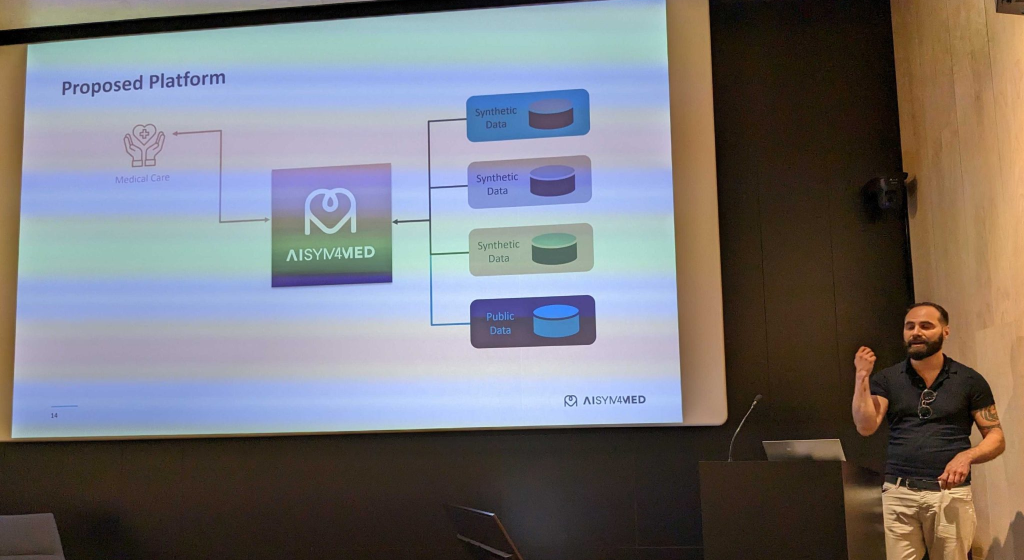Last Thursday, AISYM4MED took center stage at HEALTHDATASUMMIT 2025, participating in a dedicated session alongside other project from the HEALTHDATA4EU Cluster. The session focused on the critical role of synthetic data in advancing medical AI while ensuring privacy and data security.
AISYM4MED: A Scalable Synthetic Data Platform for Medical AI
During the session, the AISYM4MED team presented their work on developing a synthetic and scalable data platform to empower AI-driven medical applications. The project, which leverages synthetic data to train AI models, aims to enhance clinical decision-making while addressing the challenges of data privacy, replication, and realism.
AISYM4MED’s research is built around five use cases, each targeting a specific medical challenge:
- Diabetic retinopathy detection and prediction
- Retrospective extraction of clinical knowledge
- Advanced Parkinson’s disease analysis
- Epileptiform tissue detection in epilepsy surgery
- Integration of multi-modal medical data for AI applications
A key highlight was the epilepsy use case, which focuses on electroencephalogram (EEG) and MRI data. The project explores synthetic intracranial EEG (ioECoG) generation and evaluates its fidelity through advanced statistical and machine learning techniques. The team demonstrated how synthetic data can mimic real-world data distributions, making it a valuable tool for AI training while preserving patient privacy.
One of the most engaging aspects of AISYM4MED’s presentation was a survey experiment where participants were asked to differentiate between synthetic and real data. The results? Most couldn’t tell the difference. This experiment, along with detailed statistical comparisons (such as PCA and correlation analysis), provided strong evidence that synthetic data can effectively replicate key medical patterns.
AISYM4MED is also collaborating with Fraunhofer to develop pyMDMA, a library that ensures synthetic data meets high standards of quality, validity, and privacy. Their approach integrates multiple evaluation metrics, combining statistical, frequency domain, and nonlinear analyses to comprehensively assess the fidelity of synthetic medical data.
A Growing European Effort in Synthetic Healthcare Data
The session also featured other HEALTHDATA4EU projects tackling the following topics:
- SYNTHIA is defining the gold standard for privacy-preserving synthetic data in the EU.
- SYNTHEMA is working on real-world data harmonization for sickle cell disease research.
- PHEMS is addressing data-sharing challenges in pediatric and rare diseases.
- PHASEIVAI presented the risks and benefits of differentially private synthetic data in clinical research.
- FLUTE is focusing on federated learning for prostate cancer AI models.
- SECURED EU is generating synthetic mammogram data for AI applications.
The key takeaway from the session? Synthetic data is not a replacement for real medical data, but a crucial tool to bridge data gaps, enhance AI development, and ensure privacy compliance.
AISYM4MED’s work continues to push the boundaries of synthetic data in medical AI, and with ongoing collaborations, the project is set to make a lasting impact on the future of privacy-preserving, high-quality AI in healthcare.
Stay updated with AISYM4MED by signing up to our newsletter and to our #CoP if you would like to engage in the discussion!



